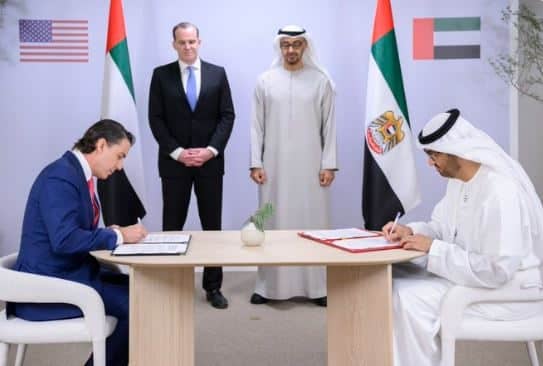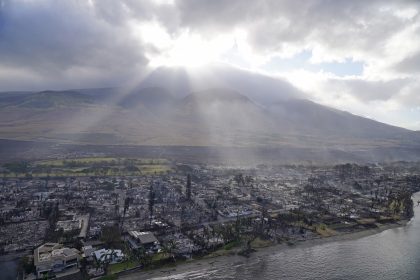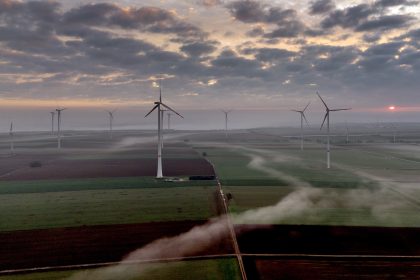White House, UAE Sign Pact to Accelerate Clean Energy Transition

ABU DHABI, UAE — The Biden administration and the United Arab Emirates signed a major new clean energy framework Tuesday, agreeing to jointly invest $100 billion in projects intended to produce 100 GW of clean energy by 2035.
The agreement was signed by presidential advisor Amos Hochstein and Dr. Sultan Al Jaber, UAE minister of Industry and Advanced Technology.
The signing ceremony was also attended by UAE President Sheikh Mohamed bin Zayed Al Nahyan, who promptly tweeted out a photograph of the milestone moment.
In a statement sent to reporters at about 3 a.m. Washington time, White House Press Secretary Karine Jean-Pierre called the new strategic partnership “a bold step toward the resilient, affordable clean energy future the world needs.”
In addition to accelerating clean energy financing in both countries, the new partnership is intended to spur robust commercial investment and support emerging economies whose clean development is both underfunded and essential to the global climate effort.
“Through the partnership, the U.S. and UAE “will focus on the scalable development of low-emission energy sources,” Jean-Pierre said.
In addition, she said, the two countries will invest in the management of harmful emissions like carbon and methane, the development of advanced nuclear technology, and the decarbonization of the industrial and transportation sectors.
“The president thanks … Sheikh Mohamed bin Zayed Al Nahyan, president of the UAE, for his leadership in advancing this initiative and for hosting COP28 in 2023,” Jean-Pierre said.
“The president appreciates the hard work by both countries to negotiate this important framework,” she said.
Jean-Pierre went on to describe the deal as “ the latest demonstration of the deep strategic relationship our countries share, and of the broader U.S. commitment to promoting economic prosperity, security, and stability in the Middle East region.”
In a statement published in The Gulf News newspaper, Al Jaber, who is also the UAE’s special envoy for climate change, said, “The energy transition needs a realistic, practical and economically viable plan to deliver climate progress together with energy security and inclusive economic growth.
“The UAE-US Partnership for Accelerating Clean Energy will enable climate action while enhancing global energy security and affordability for the people of the UAE, the U.S. and nations around the world,” he said.
The new clean energy framework has four key components::
- Developing scalable low-emission energy sources and safeguarding the supply chains that support them.
- Reducing carbon dioxide and methane emissions.
- Promoting advanced nuclear energy as a clean energy solution, and
- Reducing emissions in the industrial, long-haul maritime and aviation sectors.
President Biden is scheduled to visit Egypt on Nov. 11 to attend the 27th Conference of the Parties to the UN Framework Convention on Climate Change in Sharm el-Sheikh, Egypt.
“At COP27, he will build on the significant work the United States has undertaken to advance the global climate fight and help the most vulnerable build resilience to climate impacts, and he will highlight the need for the world to act in this decisive decade,” the White House said.
The president will then travel to Phnom Penh, Cambodia, where he will attend the annual U.S.-ASEAN Summit and the East Asia Summit from Nov. 12-13.
He will then fly to Bali, Indonesia, where he will attend the G20 Leaders’ Summit Nov. 13-16.
Dan can be reached at [email protected] and at https://twitter.com/DanMcCue.

























